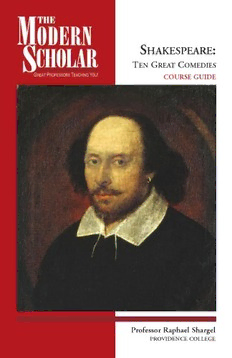
Shakespeare : ten great comedies PDF
Preview Shakespeare : ten great comedies
S : HAKESPEARE TEN GREAT COMEDIES COURSE GUIDE Professor Raphael Shargel PROVIDENCECOLLEGE Shakespeare: Ten Great Comedies Professor Raphael Shargel Providence College RecordedBooks™isatrademarkof RecordedBooks,LLC.Allrightsreserved. Shakespeare: TenGreatComedies ProfessorRaphaelShargel (cid:1) ExecutiveProducer JohnJ.Alexander ExecutiveEditor DonnaF.Carnahan RECORDING Producer-DavidMarkowitz Director-MatthewCavnar COURSEGUIDE Editor-JamesGallagher Design-EdwardWhite Lecturecontent©2009byRaphaelShargel Courseguide©2009byRecordedBooks,LLC 7 2009byRecordedBooks,LLC Coverimage:The“Chandos”portraitbelievedtodepictWilliamShakespeare,attributedtopainter JohnTaylorofTheWorshipfulCompanyofPainter-Stainers,London,ca.1580s. #UT131 ISBN:978-1-4361-6939-4 Allbeliefsandopinionsexpressedinthisaudio/videoprogramandaccompanyingcourseguide arethoseoftheauthorandnotofRecordedBooks,LLC,oritsemployees. CourseSyllabus Shakespeare: TenGreatComedies AboutYourProfessor...................................................................................................4 Introduction...................................................................................................................5 Lecture1 Shakespeare,Comedy,andShakespeareanComedy: TheComedyofErrorsandLove’sLabor’sLost....................................6 Lecture2 TheTamingoftheShrew....................................................................11 Lecture3 TheTwoGentlemenofVerona...........................................................16 Lecture4 AMidsummerNight’sDream,PartI....................................................21 Lecture5 AMidsummerNight’sDream,PartII...................................................27 Lecture6 TheMerchantofVenice,PartI............................................................32 Lecture7 TheMerchantofVenice,PartII...........................................................37 Lecture8 MuchAdoAboutNothing,PartI..........................................................43 Lecture9 MuchAdoAboutNothing,PartII.........................................................48 Lecture10 AsYouLikeIt......................................................................................52 Lecture11 TwelfthNight,PartI.............................................................................57 Lecture12 TwelfthNight,PartII............................................................................61 Lecture13 MeasureforMeasure..........................................................................67 Lecture14 TheMusicofShakespeare’sComedies: ShakespeareanVerseandSong.........................................................71 CourseMaterials........................................................................................................76 RecordedBooks.........................................................................................................80 3 Shargel Raphael About Your Professor of courtesy Raphael Shargel Photo RaphaelShargelisanassociateprofessorofEnglishatProvidence College,whereheteachesShakespeare,seventeenth-centuryliterature, drama,andfilm.HeisalsoactiveinProvidenceCollege’sprograminthe DevelopmentofWesternCivilization,ateam-taughtinterdisciplinarycourse thattracesWesternliterature,history,philosophy,theology,andthearts fromtheirbeginningstothepresentday. ProfessorShargelreceivedhisM.A.andPh.D.fromtheUniversityof VirginiaandhisB.A.fromYale.Passionateaboutteaching,hehasconduct- edclassesforstudentsofallages.Butheworkschieflyatthecollegelevel, wherehehasdevelopedareputationasathought-provokinglecturerand leaderofclassdiscussion.HehastaughtShakespeareinintroductorycours- esaswellasupper-levelseminars,whereheencouragesstudentstopay specialattentiontoShakespeare’suseoflanguage. HehasalsotaughtliteraturesurveysandclassesintheVictoriannovel, medievalliterature,nineteenth-andtwentieth-centuryAmericanliterature, andEnglishcomposition.Aloverofmovies,ProfessorShargelhastaught anddevelopedanumberofcoursesonfilm,includingintroductionstothe historyandaestheticsofthecinemaaswellascoursesonfilmromance, politicalfilms,therepresentationofraceinAmericancinema,Southernlife asportrayedinHollywoodmovies,andfilmnoir.HeisthefilmcriticforThe NewLeader. RecentpublicationsincludeaneditionofcollectedinterviewswithIngmar BergmanaswellasarticlesonplaywrightBenJonson,Shakespeare’sgreat contemporary,whichfocusonJonson’sliterarytheory,hisneglectedworks, andthehistoryofhiscriticalreception. HededicatestheselecturestoGeorgeGuidall. 4 Introduction Thiscoursetracesthedevelopmentof Shakespeareasacomicplaywrightfrom hPirsofeeasrslyoryeRaarpshtaoehliSshmaargtuerlitcyl.osely ©Clipart.com analyzestenofShakespeare’s comedies,investigatingnuancesof languageevenashecoversthebig ideaseachplayexpresses.Professor Shargeloffersstudentsinsightintotheorigins anddefiningcharacteristicsofthegenreofcome- dyandtalksatlengthabouthowShakespeare adoptedandrevisedthecomicformashecreatedhismasterpieces. OneoftheadvantagesofstudyingShakespeare’scomediesintheorderin whichtheywerewrittenisthatitallowsstudentstoseehowShakespeare developedasanartist.HeturnedfromcomposingworkslikeTheComedy ofErrors,Love’sLabor’sLost,TheTwoGentlemenofVerona,andTaming oftheShrew,whichconformtoandupdateclassicalandmedievalmodels, topenningstrikinglyuniqueplaysthatsetopposingworldsincontrast. AMidsummerNight’sDreamplungesitshumancharactersintoanunpre- dictablytransformativeworldofmagicwhileTheMerchantofVenicesets itsfairy-taleelementsinthebrutalworldofcommerceandexchange.The romanticcomediesMuchAdoAboutNothing,AsYouLikeIt,andTwelfth Nightfeaturemultipleplots,powerfulrepresentationsofloveandromance, andextraordinarygameswithlanguage.Laterstill,Shakespearecomposed thedarkanddisturbingMeasureforMeasure,whichrevisitscomicconven- tionsonlytodemonstratetheirlimitations. Butnomatterhowserioustheirthemesanddespitetheirwildlyunpredictable climaxes,Shakespeare’scomediesarealwaysdelightful,brimmingwithhilari- ousdialogue,wonderfulcharacters,andfunnysituations.Theworldof Shakespeareancomedyteemswithwomenwhomasqueradeasmen,men whowoowomenunderassumedidentities,youngloverswhorebelagainst theoldergeneration,wiveswhorebelagainsttheirhusbands,lordswho choosetogointoexile,servantsandjesterswhoprovemorecleverthantheir masters,philosopherswoundedbythefolliesoftheworld,witswhoexploit thosesamefolliesfortheentertainmentoftheaudience,menoffaithwho seektoprovethattheirfallenfriendscanrisetoamoreenlightenedstate,and agentsofthemarketplacewhodemandthatthosetheydealwithfallvictimto thebottomline. ProfessorShargel’slivelylecturesexplorethewit,charm,andbrillianceof someofthebestplayseverwritten. 5 Lecture1: Shakespeare,Comedy,andShakespeareanComedy: TheComedyofErrorsandLove’sLabor’sLost TheSuggestedReadingsforthislectureareShakespeare’s“TheComedy ofErrors”and“Love’sLabor’sLost”inTheRiversideShakespeare. PASSAGESFORSTUDY Invocation OforaMuseoffire,thatwouldascend HenryV Thebrightestheavenofinvention! Prologue,1–4 Akingdomforastage,princestoact, Andmonarchstobeholdtheswellingscene! Love’sLabor’sLost III.i.174–205 InShakespeare’sHenryV,theactorwho IV.iii.286–362 recitestheplay’sprologueyearnsforthestage torepresentEngland’spastinallitsgrandeur. V.ii.894–929 Butatthesametime,heacknowledgesthat thetheaterisasimpleplatformacrosswhichperformersparade.Itisimagi- nationthatmakesthetheaterexciting,notjusttheimaginationoftheplay- wrightandthecast,butalsotheimaginationoftheaudienceparticipatingin theexperience. ItisinthisspiritthatIinviteyouintothegorgeous,thought-provoking,and magnificentlyfunnyworldofShakespeareancomedy,whichIpresenttoyou onthesimpleplatformoftheselectures.Ifyouarealreadyfamiliarwiththe comedies,Ihopemylectureswillgeneratesufficientinterestthatyou’llwant toreadthemagainorperhapstobuyticketsforanupcomingperformance.If youdon’tknowthem,Ihopemydiscussionoftheplayswillencourageyouto maketheiracquaintance. Inthisintroductorylecture,I’llmakesomeremarksaboutcomedyanddefine itagainstitsopposite,thegenreoftragedy.I’lldemonstratehowShakes- peare,inhiscomedies,bothborrowsfromandupdatesthecomictradition. I’llthenofferamoredetailedsenseofShakespeare’sengagementwiththat traditionbybrieflydiscussingtwoofhisearliestplays,TheComedyofErrors andLove’sLabor’sLost. TragedyandComedy Whatdifferentiatescomedyfromtragedy?Canwesimplysaythattragedyis thegenreoftearsandsadnesswhilecomedyisaboutfunandlaughter? Whileonecanimagineexceptionstoalmostanyrule,intheclassicalperiodit wasgenerallyagreedthattragedywasthedramaofstatewhilecomedydealt morewithcommonissuesandordinarypeople. Theheroesoftragedywerefiguresfromthenobility.Comicprotagonists NE camefromthemiddleortheworkingclasses.Tragedywassetinthecourtor O inbattlefields.Comediescouldtakeplaceinthecountryside,butweremost E R oftensetinthecity. U T Tragedywasthedramaofseparation.Itscharactersendedbybeingisolated C E fromoneanother.Comedywasthegenreofunity.Intheend,itscharacters L 6 gottogether.Becausetheultimateformofisolationis death,tragediestendedtoendindeath.Comedies,by contrast,oftenwrappedupwithhusbands,wives,and childrenfindingthemselvesreunitedorwithamarriage thatpromisedthebeginningofanewfamily. Notethatinorderforbothgenrestoendastheydo,they must,ifthereistobeanyintrigueatall,beginintheoppo- sitestate.MostofShakespeare’scomediesopenin momentsoftension,wherecharacterswhowillultimately uniteareseparatedfromoneanotherandatodds. Tragedynegotiatesnotionsoflawandjustice,askingus toworryaboutwhatisandisnotfair.Comedy,onthe otherhand,tendstobemoredemocratic.Incomedies, severalpointsofviewcancoexist.Wemaybeinvited m ttSohWhesahyykemoenpsppwpaoetehsasiezrteeuedaawycnihtSdhohHmtahikoseerreSs.potheuaarnrceeoisnnethoeftchoenmte,xetvoefnthwehheinsto- ©SerhiyKyrychenko/shutterstock.co ryofdrama,wediscoverthathiscomediesincorporated elementsfromalmosteverytypeofliteraturethatprecededitwhilealsostak- ingoutnewanddelightfulterritory.InShakespeare’scomedies,wecan detectelementsoftheGreekplaywrightAristophanes,whoperfectedwhat wasknownasthe“OldComedy,”aswellashisLatinsuccessors,Plautus andTerence,whowroteinthelatertraditionof“NewComedy,”whichis similartothesituationcomediesoftoday. InShakespeare,wealsofindaspectsofmedievaldrama,theromancetradi- tion,andearlynovels,manyofwhichShakespeareadaptedwhenhewrotehis comedies.Indeed,withtheexceptionofLove’sLabor’sLostandAMidsummer Night’sDream,alloftheplayswewillstudyinthiscoursearedrawndirectly— andinsomecasesextensively—fromearliersources.Nevertheless,itisimpor- tanttorecognizethatwhileShakespeareborrowedtheplotsofotherwriters andimbuedhischaracterswithpersonalitiesinventedbypredecessors,these plotsandcharacterssurviveintheliteraryimaginationbecauseofwhat Shakespearedidtothem.Indeed,oneofthedefiningcharacteristicsof Shakespeare’soriginalityisthewayhebreathedlifeintooldplaysandtales. PlautusandTheComedyofErrors BesidetheeightcomediesI’lldiscussinsubsequentlectures,therearetwo others,probablywrittenveryearlyinShakespeare’scareer,thatwillhelpset upsomeofthiscourse’sthemes.TheyareTheComedyofErrorsandLove’s Labor’sLost,bothofwhichrevealShakespearedabblinginandrevamping earlierdramatictraditions. InTheComedyofErrors,Shakespeareborroweddirectlyfromplaysby Plautus,particularlyTheBrothersMenaechmus.InPlautus’sversion,twin brothersareseparatedatbirth.Oneofthemhassettledwithhiswifein Epidamnus,wherehekeepsamistressinthehouseacrossthestreet. Meanwhile,theother,totallyunawarethathehasanidenticaltwin,comesto 7 town.Theplayisfilledwithcomicconfusionasthelovedonesandacquain- tancesofonebrothermistakehistwinforhim. ShakespearesethisrevisionofPlautusinthecityofEphesus.InThe ComedyofErrors,AntipholusofEphesus,likethemarriedbrotherin Plautus’splay,hasamistressandawife.Hetoorunsintotroublewhenhis actionsaretakenforthoseofhisvisitingtwin,AntipholusofSyracuse. Shakespeare,however,compoundstheintriguebygivingeachAntipholusa servant.Theseservantsareanothersetoflong-losttwins!TheactioninThe ComedyofErrorsisevenfasterandmorechaoticthanthatinPlautus. Shakespeare,atthisearlystageofhiscareer,composedaplaywhosecon- clusioniswonderfullytidy.Itendsinaunionwheremarriagesandpactsare madeinloveandpeace.Acommunalspiritreignsattheend,onethatiscel- ebratedthroughfamilyreunionandtheforgivenessofwrongs. Love’sLabor’sLost Love’sLabor’sLostisanotherearlyplaybyShakespearethatalsofeatures anumberofstockcharactersandsituations.Butitssourcesandemphases arequitedifferent.RatherthanrelyonthetraditionsofNewComedy, Shakespeare,inLove’sLabor’sLost,drawsuponmedievalandRenaissance worksthattradeinstockcharacterswhodisplayspecificpersonalitytraits,or “humors.”WecanseeShakespeareturningawayfromhisclassicalmodels intheverysettingoftheplay,whichtakesplacenotamongtheworkingor middleclasses,butintheFrenchcourtofNavarre. AtthebeginningofLove’sLabor’sLost,theKingofNavarreandhisatten- dantlordsplantospendthenextthreeyearsdevotingthemselvesentirelyto study,abstainingfromallpleasures.Earlyon,Berowne,thecleverestand mostirreverentofthegroup,expressesdoubtsthatyoungmenshouldbe shuttingthemselvesofffromphysicaldelight. TheplansfortheacademyareinterruptedbythearrivalofthePrincessof Franceandthethreeladiesinhertrain.Makinganexceptionforthesakeof thestate,thekingandhislordsmeetwiththem,andeventhoughtheystand onoppositesidesofapoliticalfence,allfourmenfallinstantlyandhelplessly inlovewiththewomen. AtIII.i.174–205,Berownedeliversasoliloquy,atypeofspeechwherechar- acters,talkinginisolation,unburdentheirinnerthoughts.Berowne,inakind ofgloriousagony,surrendershishearttoRosalineevenasheacknowledges thatuntilthismomenthehasmockedpassionatelovers. Inthefinalscene,whenthefourlords,aftermuchhesitation,finallyconfess theirlove,thenewsisbroughttothePrincessthatherfatherhasdied.Hereis wherethetitleLove’sLabor’sLost,certainlyanoddoneforacomedy,begins toresonate.ThePrincessinformstheKingthatshemustmourn.Shewill, however,ultimatelyaccepthissuit,butonlyifhehimselfwillliveasahermit, E relinquishingthepleasuresofthecourtandsubjectinghimselftothewhimsof N O naturefortheentireyearinwhichshewillgrieve. E R Giventhebehaviorofthemenuptothispoint,andgivenalsotheserious- U T nessofmarriage,thePrincessisprobablyrighttodemandsuchstern C E penancefromtheKing.Thefoolishandlackadaisicalgestureofasceticismthe L 8 KingmadeinactImustnow,ifheistowinhisbeloved,betransformedintoa seriouscommitment. Despitethestrangenessofitsending,it’spossibletoseeLove’sLabor’s LostasamorereassuringplaythanTheComedyofErrors.Thehopeof unionisnotdestroyed.Itismerelypostponed.Thefourlordstooklovetoo lightlyupuntiltheverylastmoments.Ratherthanasktheaudiencetobelieve thattheywillsuddenlyremainchastefortherestoftheirlives,theplaycon- cedestothewisdomofthewomen,whoarerighttoimaginethatthesemen needaneducationinthehardexperiencesoflifebeforetheyarereadyto committhemselvesseriously.Havingthemenagreetosacrificetheircom- fortswhilethewomentheylovefaithfullymournhelpstheaudienceacceptas crediblethatovertimealleightcentralcharactersmaybereadyformarriage. Noneofthem,thewomenincluded,isreadynow.So,iflove’slaborsarelost forthetimebeing,theplayoffershopethatinthelongrun,thatwhichwas postponedmayintimebeachieved. Attheveryendoftheplay,whenweunderstandthatafullyearmustpass beforeourcharactersarereunited,thepersonificationofSpringandWinter stepforwardanddescribethechangingcountrysideduringtheseseasons. Thevisioninthesepoemsisnotofnobleexistencebut,inthespiritofcome- dyasdefinedbyitsclassicaldefenders,ofcommonliving,inthisinstance, theruralexistencethefourmenmustexperienceduringtheirpenance.Inthe chorusofbothpoems,abirdsingsthenotesoftheseason.Inspringtime,the cuckooremindsmarriedpeoplethatthisistheseasonofcopulation,thetime whenone’sspousemaybeturningawaywardeye.Inwinter,theowlsings merrilyincounterpointasthepeoplestruggleagainsttheforcefulnessofcold andwindandinthelaborofstayingalive: Spring:Whendaisiespied,andvioletsblue, Winter:Whenicicleshangbythewall, Andlady-smocksallsilver-white, AndDicktheshepherdblowshisnail, Andcuckoo-budsofyellowhue AndTombearslogsintothehall, Dopaintthemeadowswithdelight, Andmilkcomesfrozenhomeinpail; Thecuckoothenoneverytree Whenbloodisnipp’d,andwaysbefoul, Mocksmarriedmen;forthussingshe, Thennightlysingsthestaringowl, “Cuckoo; “Tu-whit;Tu-who!”– Cuckoo,cuckoo”–Owordoffear, Amerrynote, Unpleasingtoamarriedear! WhilegreasyJoandothkeelthepot. Whenshepherdspipeonoatenstraws, Whenallaloudthewinddothblow, Andmerrylarksareploughmen’sclocks; Andcoughingdrownstheparson’ssaw, Whenturtlestread,androoksanddaws, Andbirdssitbroodinginthesnow, Andmaidensbleachtheirsummersmocks, AndMarian’snoselooksredandraw; Thecuckoothenoneverytree Whenroastedcrabshissinthebowl, Mocksmarriedmen;forthussingshe, Thennightlysingsthestaringowl, “Cuckoo; “Tu-whit;Tu-who!”– Cuckoo,cuckoo”–Owordoffear, Amerrynote, Unpleasingtoamarriedear! WhilegreasyJoandothkeelthepot. –Love’sLabor’sLost, V.ii.894–929 9
